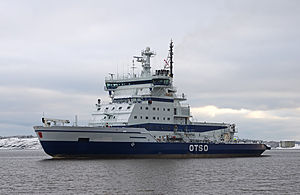Otso (icebreaker)

Otso returning from sea trials to the icebreaker base at Katajanokka, Helsinki, on 18 January 2012.
|
|
| History | |
|---|---|
|
|
|
| Name: | Otso |
| Namesake: | Finnish epithet for bear |
| Owner: | Finnish Maritime Administration (1986–2004) Finstaship (2004–2010) Arctia Icebreaking (2010–) |
| Port of registry: |
Helsinki, |
| Ordered: | 19 March 1984 |
| Builder: | Wärtsilä Helsinki Shipyard, Finland |
| Cost: | FIM 235 million |
| Yard number: | 472 |
| Launched: | 12 July 1985 |
| Completed: | 30 January 1986 |
| In service: | 1986–present |
| Identification: | IMO number: 8405880 Call sign: OIRT MMSI number: 230252000 |
| Status: | In service |
| General characteristics | |
| Type: | Icebreaker |
| Tonnage: | 7,066 GT 2,120 NT |
| Displacement: | 9,130 tons |
| Length: | 99 m (324 ft 10 in) |
| Beam: | 24.2 m (79 ft 5 in) |
| Draft: | 8 m (26 ft 3 in) (maximum) |
| Ice class: | 1A Super Polar Class 4 (2015–) |
| Installed power: | 4 × Wärtsilä Vasa 16V32 (4 × 5,460 kW) |
| Propulsion: | Diesel-electric (AC/AC) Two shafts; fixed-pitch propellers 15,000 kW (combined) |
| Speed: | 18.5 knots (34.3 km/h; 21.3 mph) 10 knots (19 km/h; 12 mph) in 0.8 m (31 in) level ice |
| Crew: | 20 |
Otso is a Finnish state-owned icebreaker. Built by Wärtsilä Helsinki shipyard in 1986 to replace the aging Karhu-class icebreakers, she was the first Finnish post-war icebreaker to be built without bow propellers. Otso has an identical sister ship, Kontio, which was delivered in 1987.
In the early 1980s, the Finnish National Board of Navigation began looking for a replacement for the aging Karhu-class icebreakers Karhu, Murtaja and Sampo which had been built in the late 1950s and were no longer wide enough to escort modern merchant ships. Furthermore, the old icebreakers were expensive to operate and, despite their small size, required a relatively large crew of 53. The development of the new class of icebreakers, dubbed Karhu II in the preliminary papers, intensified when Wärtsilä opened a new ice model test facility in 1983. The tenth post-war icebreaker of Finland was ordered from Wärtsilä Helsinki shipyard on 19 March 1984 with a price of FIM 235 million. The ship was launched on 12 July 1985 and delivered to the owners on 30 January 1986. Her name, Otso, is one of the many epithets for bear in the Finnish language. In January 1987, Otso was followed by a similarly-named sister ship, Kontio, after which the three Karhu-class icebreakers were decommissioned and sold.
During extensive ice trials in the Bothnian Bay in March 1986, Otso was put through a series of test to determine her icebreaking capability. In a race against the 1975-built Urho in 0.8-metre (31 in) level ice, Otso beat the older but more powerful four-propelled icebreaker by more than a ship's length, showing that in terms of ice resistance the new icebreaker was superior to her predecessor. In 40-centimetre (16 in) ice, she could easily maintain a speed of 16 knots (30 km/h; 18 mph) and small ice ridges along the way appeared to be of no consequence to the vessel. However, the strength of the new icebreaker was put to the ultimate test when she encountered a large pressure ridge reaching all the way to the seafloor some 20 metres (66 ft) below the surface. After preparations, Otso was accelerated to a speed of 14 knots (26 km/h; 16 mph) and rammed into the ridge at full power. Since the new icebreaker had a smooth inclined stem and lacked the bow propellers of her predecessors, she rode up the ridge and began listing to the port side as the hull rose from the water. After coming to a stop, Otso slid back by herself without utilizing the engines, and the ridge was penetrated on the second charge. The robustness of the ship and its propulsion system were further proven when the icebreaker was backed into a ridge at 10 knots (19 km/h; 12 mph) "to prove to the customer it doesn't break".
...
Wikipedia
